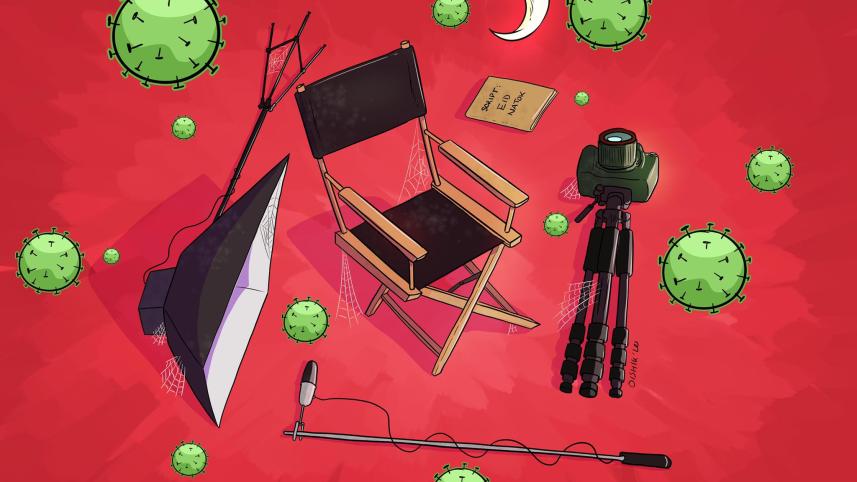World of television turned upside down

Eid is a crucial time for the television sector in Bangladesh, but this year, we are faced with unprecedented circumstances. As we battle the coronavirus pandemic, television directors and production houses are left in distress, with no new projects to look forward to anytime soon.
"Concerns over the coronavirus have forced us to stop production at once, since the nationwide shutdown began in March. In such a situation, my web film for Zee5, Jodi Kintu Tobuo, featuring Nusraat Faria and Apurba, was halted. Many of my other projects, including some which were for Bioscope, are also on hold at the moment," shares film and television director Shihab Shaheen. "This Eid, we will mostly watch repeat telecasts of tele-fictions, through which the channels may earn, but our cast and crew will not be benefitted at all. I wish, channels, especially the ones we regularly work with, could support us more."
He also sheds light on how the scenario has made directors productive, yet idle. "The isolation period is giving every creative individual more time to think and innovate, but at the same time, we cannot create. All we can do is wait," he says. "Even when this ordeal ends, eliminating people's fears will not be easy. As a result, working in a crowded environment, with the cast and crew, will be a challenge for most of us."
Director Shafayet Mansoor Rana's last production was released on Valentine's Day, this year. "As of this Eid, I have not planned anything yet and I am trying to think of doing something. But I can't make any promises," he says. "I am more worried about our crew members, such as our light-men and spot boys, especially the ones who earn daily wages. Eid comes with many opportunities for them. However, this season, they are left with no work, for the time being. The world of tele-fictions is yet to be officially declared as an industry. As a result, unlike other labourers, they are yet to receive any form of official support in this time of crisis."
Many feel that their ways of working will change in a post-coronavirus world. "Among other things, what worries me the most is our safety. This plague will end, but people will still look towards social distancing," adds Rana. "As we do not have permanent infrastructures, such as shooting spots, we mostly shoot in residential areas and outdoor locations. We might come across certain unsuitable circumstances, which will be a challenge not only for me as a director, but for the whole cast and crew associated with the project."
Production houses were barely able to make anything for this Eid season. "The pandemic has left us with economic and intellectual setbacks. Eid is one of the most important occasions for television actors, directors and producers. Sadly, this year, there will be no new productions as we cannot shoot," mentions Ashfaque Nipun, Director and Proprietor of Pack Up Films.
He also spoke about the long-term effects of the shutdown. "The visual medium is one of the most popular forms of entertainment in the country. "Under such circumstances, where we are yet to make a stable space for ourselves in international platforms like Netflix and Amazon Prime, as a director, I feel derailed from my intellectual practice," explains Nipun. "The comeback of tele-fictions will also be a challenge, as the world will never be the same again. Production houses will look to cut down their costs, which will affect the quality of the projects. On the other hand, the audience, bored from a long period of isolation, will have high expectations. As a result, turning them back towards Bangla tele-fictions will be one of the biggest challenges."
The pandemic has not only put television productions on hold, but also slowed down the post production formalities, necessary before releases. I pre-planned and worked on three to four tele-fictions for Pohela Boisakh, which I could not release, because the clearance process was slowed down after the coronavirus outbreak. However, we are done with the last-minute touches for these tele-fictions and they will be aired on Eid," shares director Mizanur Rahman Aryan. "I was also in talks for five other productions and we even started shooting for one. Sadly, we had to stop after the first day of shoot."
Nevertheless, these trying times have brought about some positive changes for Aryan. "Being a writer, I have been approached numerous times to write a book, especially when the Ekushey Boi Mela approaches. However, with busy shoot schedules, I never really had the time to work on a book, until now," he shares. "Staying at home has given me some time to write my first novel, which is a love story. I am also spending a lot more time with my family."
Aryan also feels that once the isolation period ends, audiences will start looking for different types of stories. "While some will look towards plots that reflect on their conscience and make them think about certain issues, others will look to find relief through positive and delightful stories, which will eliminate their fears about this plague," he adds.



 For all latest news, follow The Daily Star's Google News channel.
For all latest news, follow The Daily Star's Google News channel.
Comments